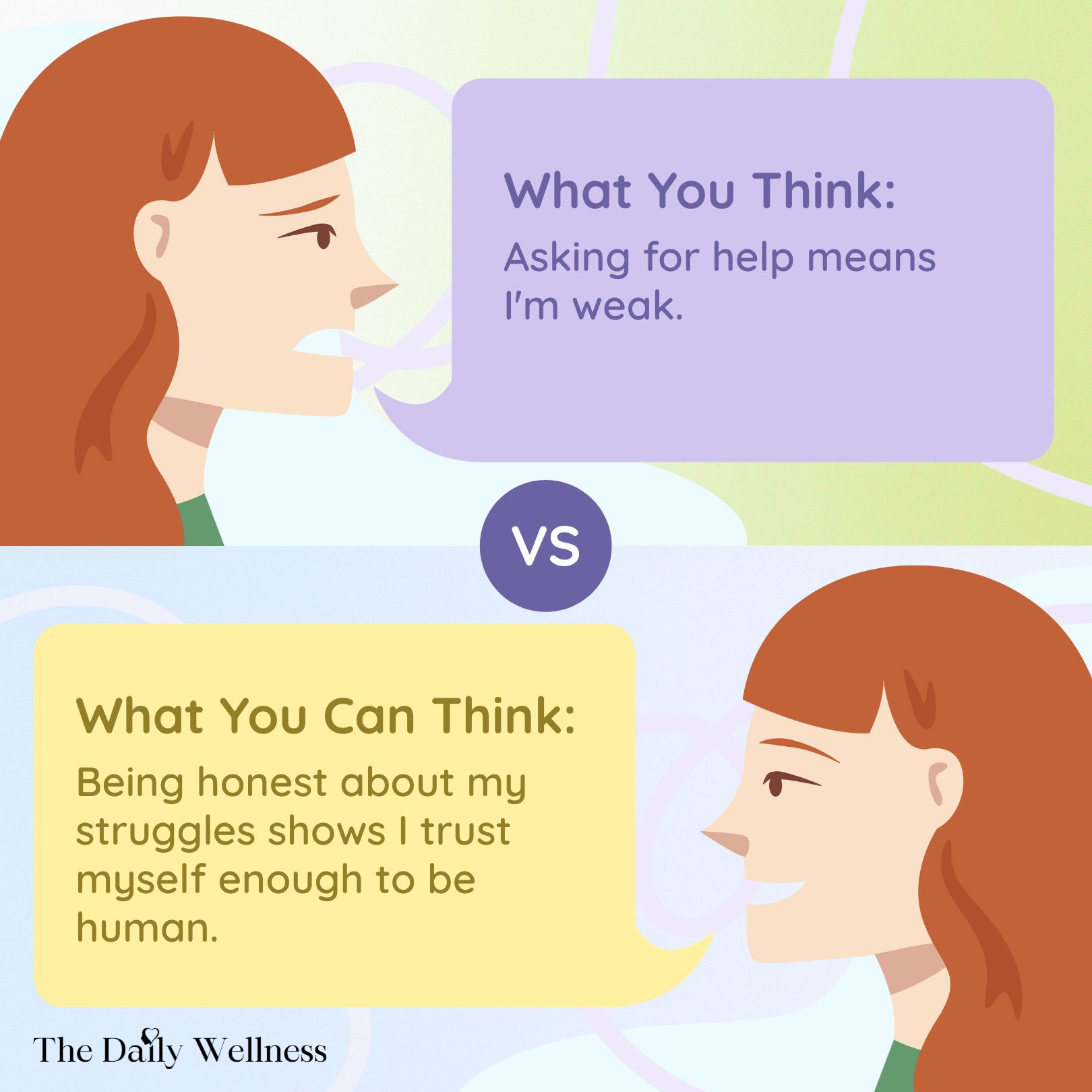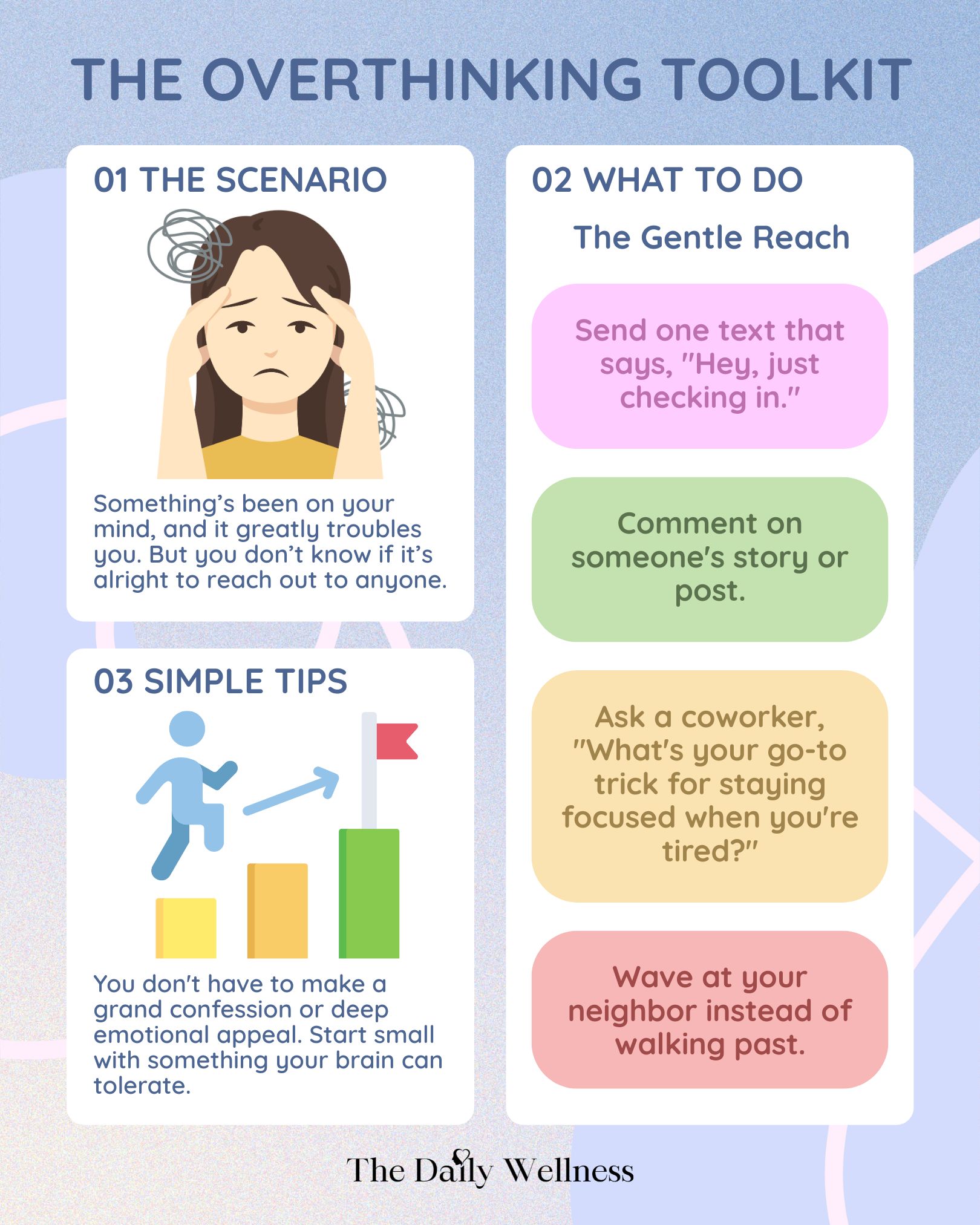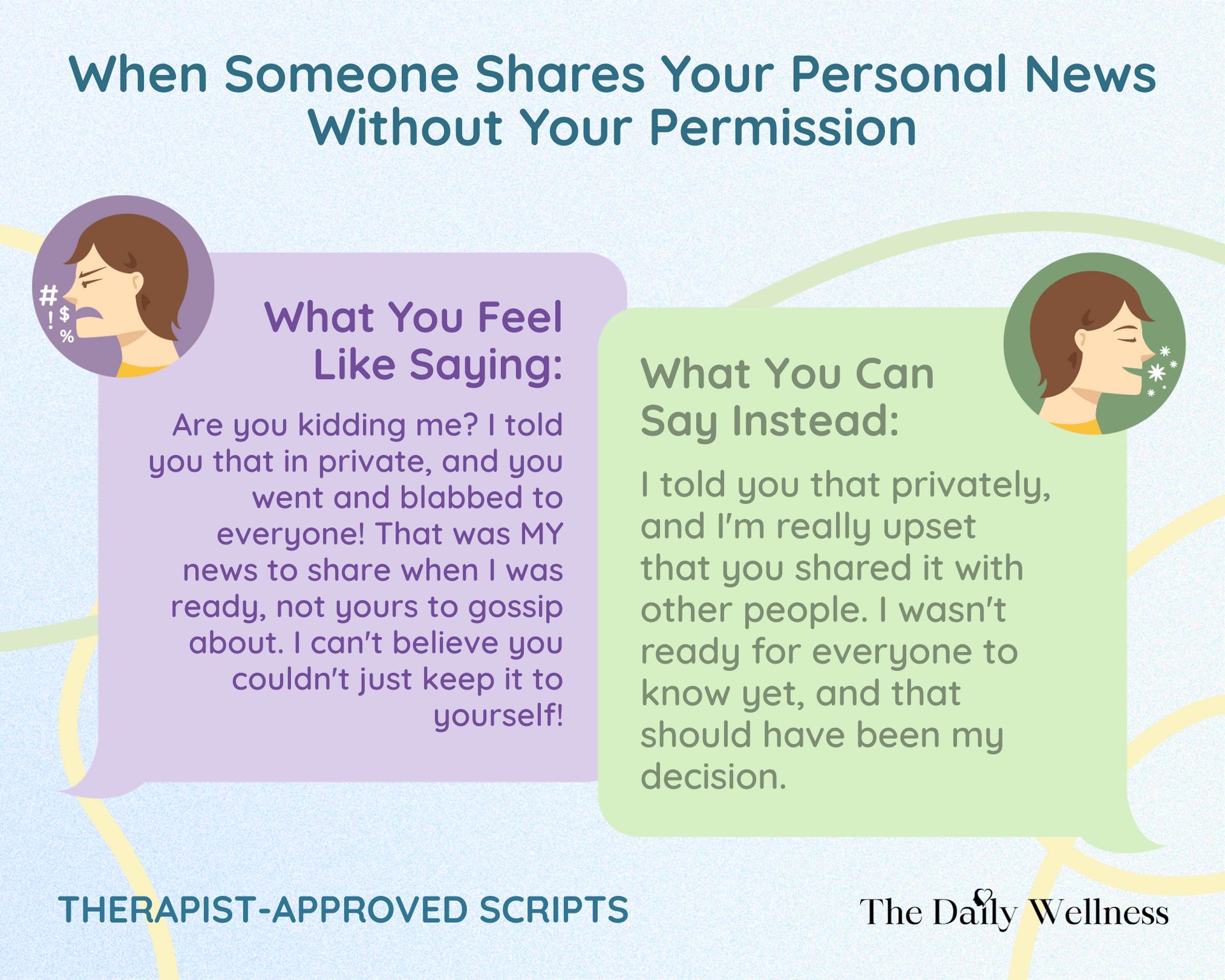Tomorrow marks World Mental Health Day, but tending to our minds starts right here, in the small ways we let others in. Today’s edition is about those quiet acts of courage, of reaching out when it feels easier to retreat, asking for help before you hit the wall, and remembering that vulnerability is a strength that keeps us human.
Today’s Quick Overview:
🌟Confidence Builders: The courage of letting others see you struggle…
🗣️ The Overthinking Toolkit: Bridge “do it alone” to gentle support…
📰 Mental Health News: Older adult mental health; Sleep and mental health…
🙏 Daily Practice: Presence over fixing, offer a small kindness…

Let's check in with what part of you needs tending today:
Which part of you is asking to be tended as the week winds down? Your body might be running on reserve. Your mind could be tired of decision-making. Your heart might be ready to feel proud, but needs permission to celebrate small. Listen and tend accordingly.
QUICK POLL
Presence isn't just meditation; it's how you tune into your actual experience throughout the day.
Which Mindful Presence Practice Would You Actually Try?
CONFIDENCE BUILDERS
The Bravery of Letting Others See You Struggle

There's a particular kind of confidence that shows up when you tell someone, "I'm not okay today." It's not the confidence of having it all together, it's the confidence that your worth doesn't depend on appearing perfect.
Rather than boosting self-worth by denying struggle, Kristin Neff’s work suggests that recognizing our setbacks with self-compassion is associated with steadier, more resilient self-regard. When you let someone see you struggle, you're saying, "I trust myself enough to be human", and that's profound confidence.
This week's challenge: Let one person see you struggling. Not in a crisis way, but in an honest human way. Text a trusted friend, "today's been really heavy." Answer "how are you doing?" with genuine honesty instead of "fine," or ask for help with something you'd normally force yourself to handle alone.
Reframe this week: Instead of "Asking for help means I'm weak" → "Being honest about my struggles shows I trust myself enough to be human."
Try this today: When someone asks "how are you?" and you're not great, respond with something real: "honestly, kind of struggling today." See what happens when you let someone see you as you actually are.
RECOMMENDED RESOURCES ON SALE
50% OFF: Transform Your Negative Thinking Today
Transform exhausting thought spirals and self-doubt into balanced thinking with this therapist-designed cognitive restructuring workbook. Get immediate access to evidence-based CBT strategies that help you identify your specific thinking traps, master techniques to challenge them, and build lasting mental resilience—all in one beautifully designed system you can use at your own pace.
Stop the mental loops that keep you stuck - Identify and dismantle the 10 most common cognitive distortions with clear frameworks that reveal exactly which thought patterns are sabotaging your peace of mind
Master evidence-based CBT techniques that actually work - Navigate from catastrophizing to calm with specific exercises proven to rewire negative thinking patterns at their source
Turn anxious thoughts into balanced perspectives - Discover why your mind creates worst-case scenarios and learn practical reframing techniques to see situations clearly
Challenge self-criticism without toxic positivity - Word-for-word scripts and thought records that help you build genuine confidence through evidence, not empty affirmations
Build mental wellness habits that last - Structured worksheets and thought diaries for daily practice with psychology-backed strategies that become second nature over time
Offer: This discount is only available for the next 48 hours.
*Your purchase does double good: Not only do you get life-changing tools for your own healing journey, but you also help us keep this newsletter free for everyone who needs it. Every sale directly funds our team's mission to make mental health support accessible to all.
THE OVERTHINKING TOOLKIT
When You’re Stuck Between “I Should Handle This Alone” and “I Really Need Help”

What's Happening: You're dealing with something hard. Part of you knows reaching out would help. But another part immediately jumps in with: "Other people have real problems. This isn't that serious. I should be able to figure this out myself."
So you don't text your friend. You don't ask for the extension. Instead, you stay stuck in this exhausting loop, debating whether you've "earned" the right to need support.
Why Your Brain Does This: This isn't about being stubborn; it's about how you learned to define strength. Many of us absorbed the message early on that independence equals capability, that needing help means you're failing somehow.
Your brain treats asking for support like admitting defeat, when really, it's just being human. The debate itself keeps you isolated, because as long as you're arguing with yourself, you're not getting the help that would ease the struggle.
Today's Spiral Breaker: The "Micro Reach-Out"
You don't have to make a grand confession or deep emotional appeal. Start small with something your brain can tolerate.
Send one text that says, "Hey, just checking in."
Comment on someone's story or post.
Ask a coworker, "What's your go-to trick for staying focused when you're tired?"
Wave at your neighbor instead of walking past.
Each small connection teaches your nervous system that reaching out doesn't equal rejection. You're reminding yourself that connection is allowed, that you don't have to wait until you're drowning to let someone know you exist. Over time, these micro-moments create the safety net that makes asking for real help feel possible.
Here's the Truth: The voice telling you to cope alone isn't protecting your strength; it's protecting old fears about being a burden. Needing support doesn't make you less capable. It makes you human. These small moments build the evidence your brain needs to believe that connection is safe, one tiny interaction at a time.
DAILY PRACTICE
Affirmation
I can offer connection without having all the answers. Sometimes presence matters more than advice, and witnessing someone's struggle is its own form of help.
Gratitude
Think of one person who made you feel less alone recently, even through something small like a text, a shared laugh, or simply listening. Their presence reminded you that you're seen.
Permission
It's okay to reach out when you're struggling, even if you feel like you're burdening someone. Allowing others to support you is a gift to them, not just to you.
Try this today (2 minutes):
Send a message to someone who might be going through a hard time. You don't need profound words. Sometimes, "I'm thinking of you" or "You're not alone in this" is everything.
THERAPIST- APPROVED SCRIPTS
When Someone Shares Your Personal News Without Your Permission

The Scenario: You told someone something personal, and they told other people without asking if that was okay. Now, friends, family, or acquaintances know your private information before you had a chance to share it yourself. You feel violated and angry, and you're dealing with people reaching out when you weren't ready.
In-the-Moment Script: "I shared that with you in confidence, and I'm upset that you told other people without checking with me first. That was my news to share on my timeline, not yours."
Why it Works: This clearly states what they did wrong, explains the impact without over-explaining, and centers your right to control your own information without leaving room for excuses.
Pro tip: If they respond with "I thought people should know" or "I was just excited for you," you can say: "I understand your intentions, but it wasn't your decision to make. From now on, please ask before sharing anything I tell you."
Don't let their excitement or good intentions excuse a violation of your privacy. Your personal information belongs to you, not to whoever hears it first.
MENTAL HEALTH NEWS
WHO Warns of Rising Mental Health Risks Among Older Adults. With one in six people over 70 living with a mental disorder, the WHO highlights loneliness, abuse, and social isolation as major risk factors, urging global action to promote connection, reduce ageism, and improve access to mental health care for older populations.
New Study Identifies Five Sleep Profiles Linked to Brain and Health Differences. Researchers found that five distinct sleep patterns shape mental health, cognition, and lifestyle, underscoring that sleep quality plays a vital role in overall well-being.

Evening Reset: Notice, Write, Settle
Visualization

Picture two people sitting on a bench in comfortable silence, shoulders nearly touching. Neither is trying to fix the other or fill the quiet with solutions. Just sitting together makes the weight feel lighter. Tonight, you can remember that your presence, offered without agenda, holds more power than you realize.
Journal
Spend three minutes writing: Who in my life might need to hear that they're not alone right now, and what's one honest thing I could share about my own struggles to help them feel less isolated?
Gentle Review
Close your notebook and ask yourself: When did I feel most connected to someone today? Where did I hide my struggles when sharing them might have created a connection? How can I show up for someone tomorrow in a way that says "you're not alone"?
Shared Wisdom
"One of the most important things you can do on this earth is to let people know they are not alone." — Shannon L. Alder
Pocket Reminder
Your willingness to show up for someone, even imperfectly, can be the lifeline they didn't know they needed.
WANT TO CONTRIBUTE TO OUR NEWSLETTER?
Are you a therapist, psychologist, or mental health professional with something meaningful to share?
We're opening up space in our newsletter for expert voices from the field — and we'd love to hear from you.
Whether it’s a personal insight, a professional perspective, or a practical tip for everyday mental health, your voice could make a difference to thousands of readers.
👉 Click here to apply to contribute — it only takes 2 minutes.
FRIDAY’S PREVIEW
Coming Friday: Recognizing compassion fatigue in daily life and why deeply empathetic people need boundaries to make caregiving sustainable.
MEET THE TEAM
Love what you read? Share this newsletter with someone who might benefit. Your recommendation helps our community grow.
*The Daily Wellness shares educational content only and is not a substitute for professional medical or mental health advice and diagnosis. Please consult a licensed provider for personalized care.
